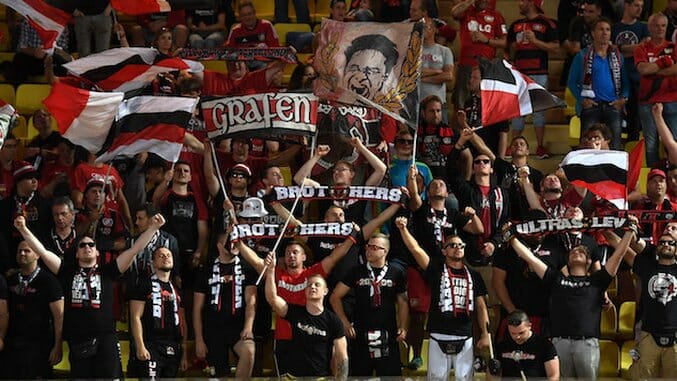EXCLUSIVE: How Bayer Leverkusen Outsmart their Wealthier Bundesliga Competitors
Photo by Valerio Pennicino/Getty
Though outmuscled financially by Bayern Munich, Borussia Dortmund, Schalke 04 and VfL Wolfsburg, Bayer Leverkusen have consistently finished high enough in the Bundesliga to consistently qualify for the UEFA Champions League.
How do they do it?
Structure is key, starting at the top with the CEO and moving on down to part-time coaches who help out at the youth levels. Bayer 04’s slogan, “Die Andere Familie” (The Other Family), captures the club’s culture. It’s more than a motto.
Originally founded in 1904 as a way for the workers at the Bayer pharmaceutical plant to play football on the weekends, the Werkself (Factory eleven) has evolved since then, particularly since 1979 when Leverkusen won promotion to the Bundesliga for the first time. CEO Michael Schade worked on the business side for 30 years before taking over as managing director in 2013, and has overseen many of these changes.
“You know that there is a lot of activities in other stadiums, a lot of criminality and so on, we are so much focused on security. We are so focused so that parents and their children can come to the stadium. We are offering special days for the kids with activities, because we want to bring them to the stadium as soon as possible, as early as possible. These are the fans of the future. That’s why our slogan is “The Other Family.” This is a family stadium. Not only focused on fans that are exploding bombs and things like that. This is the main thing,” Schade says.
Slawomir Czarniecki has been with the club for quite a while as well. Czarniecki oversees youth development, which works a little differently at Bayer compared to other German clubs.
Rather than fielding a Bayer Leverkusen 2 squad to would play in Germany’s fourth tier, the club fast-tracks the player development pathway to prepare talented youngsters for the rigors of top-flight football.
“I was born in Poland but I have been in Germany for 26 years,” Czarniecki recalls. “I started in 2000 working for Bayer Leverkusen as a youth coach, so seeing Kevin Kampl on the pitch today [is great]. He was one of my first players in the youth team at U10. I am now responsible, together with the academy director, for our oldest age groups: the U17s and U19s,” Czarniecki says.
“It’s our philosophy that we do not have a second team—the oldest age group at the academy is U19 and we try to prepare them as good as we can for the first team. That is the next step for them. You look at Benjamin Henrichs as a positive example – he started with the academy at U8 and has been here now for 12 years,” he explains.
Henrichs, 19, has started six times in the Bundesliga and twice in the Champions League this campaign, already playing more league minutes (540) this year than he did all of last year combined (538).

-

-

-

-

-

-

-

-

-

-

-

-

-

-

-

-

-

-

-

-

-

-

-

-

-

-

-

-

-

-

-

-

-

-

-

-

-

-

-

-










































